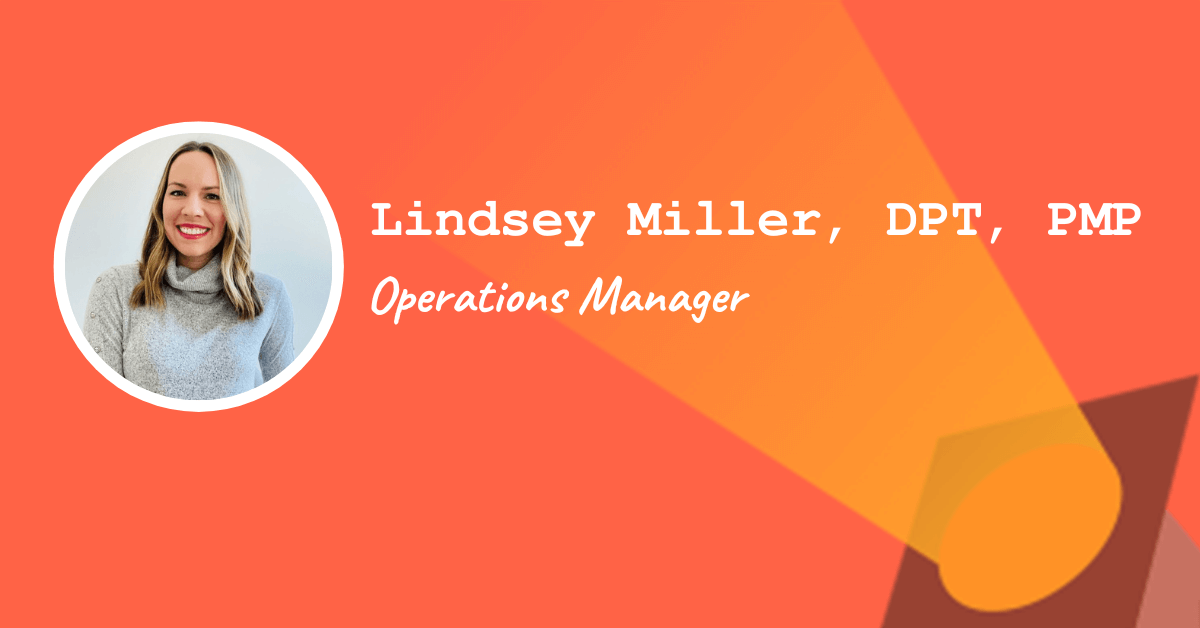This week’s spotlight is on Lindsey Miller, DPT, PMP, who now works as an Operations Manager for ECRI! She also shares SO MUCH wonderful information in a Non-Clinical Deep Dive bonus video in Non-Clinical 101!
This post may contain affiliate links or codes. This won’t increase your cost, but it helps keep TNCPT alive, and free of annoying ads! Thank you for your support. 🙂
What is your full name, title, and company name for your current, primary role?
Lindsey Miller, DPT, PMP – Operations Manager for ECRI

What additional roles do you currently have?
I am also serving as the co-lead of a new employee resource group (ERG) for women at my organization!
Where are you located?
Pennsylvania
Where did you go to PT school, and what year did you graduate?
Duke University, in 2012
What did you do when you first finished school, and for how long?
I worked in a private PT clinic within a retirement community for about a year. In search of a treatment model with one-on-one patient care and longer visits, I decided to try home health.
While I found being alone in the patient’s homes disconcerting, I felt more suited to the scheduling model because of the built-in brain breaks when driving between patients.
I stayed in this home health position for five years. I grew more confident in my skills and clinical judgement with time, but always experienced heightened anxiety over the uncertainties of the job. From worrying about my patients’ fragile conditions, to wondering how I’d ever make it to all my patients each day, to managing uncontrolled home environments. I struggled to sleep through the night and maintain a calm demeanor during the day.
Please refrain from contacting our spotlight participants on social media. There are thousands of readers just like you out there. 🙂 Please ask your questions in the comments on this blog post.
If you’re a Non-Clinical 101 student, Lindsey has a Non-Clinical Deep Dive bonus video that you can find in the course! Plus, you can network with her in our NC101 alumni groups!
What did you enjoy about your early roles? What didn’t you enjoy?
I enjoyed getting to know my patients, working as part of an interdisciplinary care team, troubleshooting challenges, and developing care plans.
I did not enjoy the uncertainties of the day to day, fast pace, and responsibility for patients’ well beings.
When and why did you decide to do something non-clinical?
I felt stuck in PT for years. My peers and colleagues seemed to enjoy their clinical practice, but I couldn’t shake the feeling that I might have chosen the wrong career. I didn’t think my PT degree would qualify me for any other jobs, and I had significant loan debt to address.
I spent years fantasizing what it’d be like to have a job removed from the potential to directly impact a person’s health and well-being. While my coworkers loved the fast paced variability of their day to day, I dreamed of sitting at a desk all day.
I thrive in predictability and planning, and thought, “What could be better than knowing exactly where I’d sit everyday?” I’m not sure what caused me to enter “non-clinical AND PT” into Google one day in 2017, but that one act of turning curiosity into exploration changed my life and the trajectory of my career forever.
As thousands of other therapists have, I discovered The Non-Clinical PT and was thrilled to discover the network of other therapists with similar interests. I immediately joined the community, and not long after, TNCPT shared a non-clinical position that happened to be located one mile from my house. The position, a Quality Assurance and Performance Improvement Coordinator for a home health agency, was perfectly suited to my strengths and experience–it required either a PT or RN license, and 3+ years of home health experience.
I applied immediately, excited about the prospects of improving the lives of patients AND clinicians by “swimming upstream” and affecting processes to promote quality of care.
When I announced that I’d be leaving patient care, a coworker said,
“You’re telling me you want to sit at a desk all day?”
“Yes,” I said with a smile, knowing for sure that’s exactly what I wanted to do.
Editor’s note: Want to read more about quality management? Check out this spotlight on Jessica Merino, PT, DPT, who is now a performance improvement coordinator in the home health division of a hospital system!
What are you doing these days?
I spent two years in the home health quality position before deciding to investigate other opportunities that might offer additional growth and advancement. I used Coursera to explore UX Design as well as Project Management. Both were enjoyable because of the potential to improve systems and processes in order to reduce user pain points.
Around that same time, my employer provided me and my department with Root Cause Analysis training through a company called ECRI. This was my first exposure to ECRI, an independent non-profit organization that serves the healthcare industry through patient safety, evidence-based medicine, and technology decision support.
I started following ECRI on LinkedIn, curious to learn whether they might have job opportunities for which I was well suited. Soon after, I applied to a project management position and was hired. After I joined ECRI, I immediately felt at home in the position.
For one, I get to physically work in my home (the position is fully remote), and two, the combination of my clinical background and newly developed project management skills are celebrated.
I have since been promoted, and now serve as an operations manager. In this role, I manage client-facing projects, as well as continuous improvement projects to improve processes throughout the organization as a whole.
Are you still treating patients, or are you solely non-clinical?
I am solely non-clinical and do not plan to return to physical therapy practice.
How long have you been in your current role?
I have been with ECRI since June of 2021.
Did you get any special certifications or training along the way to help you get into your current role?
I took the Google Project Management Certification course through Coursera and obtained my Project Management Professional (PMP) certification through the Project Management Institute.
ECRI has also afforded me the opportunity to complete Lean Six Sigma Green Belt and Black Belt training. I hope to earn my certification soon!
Did you do anything special to your resume and cover letter to land the job?
During my most recent job search, I was looking for project management roles outside of direct health care.
I was concerned that recruiters would be confused or distracted by the “PT, DPT” credentials on the name line of my resume, so I removed the credentials, but of course listed my licensure later in the resume.
I’m not sure if that was helpful, but I did feel like I started hearing back from potential employers soon after. I also worked hard to write a strong cover letter to explain my relevant experience without sounding like a “burnt out clinician.”
How have people reacted to you leaving patient care?
When I first left patient care, my friends, family, and coworkers were encouraging but surprised that I would “throw away” my education and clinical skills. I was lucky to feel instantly at home in my new career, so it wasn’t long before a growing number of clinicians started expressing interest in exploring non-clinical work. It brings me joy to help guide others on their journey to new careers.
What’s a typical day or week in the life like for you?
I have a 100% remote position. My day is spent collaborating with colleagues and clients to project manage and build internal and external deliverables.
I look forward to work every day, and my days fly by.
What are some of the rewards of your role? What are the biggest challenges?
It is innately rewarding to have found a career path which suits my personality, strengths, and interests. I feel excited to start working every day.
The challenges I experience are now fun. I am confident I either have the skill set I need to overcome them and if not, I’m motivated to gain the skill set I need to grow.
How did your clinical background prepare you for this role? Which skills transferred?
I describe project management as physical therapy for processes rather than humans. Both professions require empathy, a structured assessment of the situation, goal setting, and careful planning.
Roughly speaking, how are the hours and pay compared to patient care?
Moving out of clinical care has increased my pay and growth potential.
What type of person do you think would do well in your role?
Therapists interested in working non-clinically are well suited to project management as long as they have attention to detail, are organized, and are systematic in their approach to developing or improving processes.
Does your organization hire PT, OT, or SLP professionals into non-clinical roles?
Yes! There are many clinicians at my organization. Having clinical experience is highly valued, though not required.
Do you have any recommended resources you’d like to share?
Recommended Courses
Recommended Books
- Untamed by Glennon Doyle
- Think Again by Adam Grant
- How I Built This by Guy Raz
- Atomic Habits by James Clear
- Brene Brown (anything)
Recommended Podcasts
- PMP Exam Prep Success Secrets podcast
- Experts on Expert with Dax Shepard podcast
- A Slight Change of Plans with Maya Shankar podcast
- WorkLife with Adam Grant podcast
- We Can Do Hard Things with Glennon Doyle podcast
What is a typical career path for someone in your role?
Project managers have lots of transferable organizational and planning skills. They can move into Program Management, Operations Management, Business Management, etc.
What is next for you? What are your high-level career aspirations?
I’d like to continue to build my leadership and management skills, and take on increasingly challenging process improvement projects. I plan to continue moving in the direction of my interests and exploring curiosities.
I don’t know where each step will take me, but I’m enjoying the journey.
What would you recommend to someone who is considering going into a role like yours? Do you have any special words of wisdom for the readers?
I spent so much time feeling stuck, not realizing I had translatable skills that could help me succeed outside of healthcare. One day, I realized that the energy I was spending feeling stuck and discouraged could be re-distributed towards exploration.
My advice for those who feel stuck and uncertain is to take one step towards what interests you every day.
What would you teach to today’s graduate students in your profession, if you had the opportunity?
I would teach students how to identify their strengths and use their passions to create careers that they find fulfilling, whether that be in direct patient care roles, or otherwise.
Do you have any special advice for others who want to follow in your footsteps?
As stated by James Clear in his book Atomic Habits:
“Boiling water will soften a potato but harden an egg. You can’t control whether you’re a potato or an egg, but you can decide whether to play a game where it’s better to be hard or soft. If you can find a more favorable environment, you can transform the situation from one where the odds are against you to one where the odds are in your favor.”





